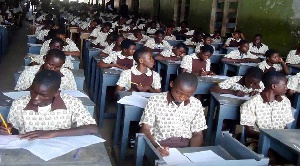Civil society organisations in the Savannah Accelerated Development Authority (SADA) area have staged fresh protests over another long delay on the part of government in releasing feeding grants to public senior high schools in northern Ghana.
The organisations say they have every right to doubt the possibility of a nationwide free senior high education promised by government if the same government cannot feed boarding students just within the three regions in the north alone.
The groups registered their protests when they met with the Upper East Regional Minister, Rockson Ayine Bukari, Tuesday in Bolgatanga, the regional capital.
“It is a serious case and it is moving into a crisis situation. It is getting to a point where schools would be forced to close down and students go back not because teachers are on strike, not because there is no teaching and learning material but because there is no food in the stomachs of these students to sit and learn.
Headmasters are struggling and they are not getting the food. The food suppliers are complaining of the high debts the schools and the government owe them. That is the issue that we are worried about.
“If you are unable to provide food to young people in only second-cycle institutions in the three northern regions, we would not be convinced that you would be able to effectively implement this much-cherished free education policy.
As we speak, government has not been able to release feeding grants to second-cycle institutions in the three regions in northern Ghana for three terms,” the Executive Secretary of the SADA Zone CSOs, Bismarck Adongo Ayorogo, told Starr News moments after the coalition had made some concerns known to the Regional Minister at the Regional Coordinating Council Conference Hall.
He added: “It was over a year, but government managed to pay just one term, leaving three full terms. And as we speak, headmasters are struggling how to keep these students. This is really affecting teaching and learning and, in a wider perspective, the growth and development of education in northern Ghana.”
Revamp collapsed industries- CSOs tell government
For initiating a number of pro-poor policies- such as one dam for every village, one factory in every district, farming for food and jobs, abolition of levies on porters (kayayei) and free education- the coalition patted government on the back, but also pressed for the revamp of collapsed factories within the Northern Savannah Ecological Zone.
“The coalition wishes to humbly request of the new administration to adopt the SADA Master Plan which is a perfect match with government’s agricultural and industrialisation policies. In this plan, there is an extensive Commercial Agriculture Investment Guide as a masterpiece to guide decision-making in agriculture. Potential dams have been mapped and soil and crop suitability types have been detailed.
“Revamp all defunct agro-based industries such as the Northern Star Tomato Factory, the Meat Factory and the Rice Mill and establish new ones such watermelon and other fruit juice factories. Introduce special initiatives on groundnut farming by setting up Groundnut Development Board. Boost shea butter production through the establishment of shea plantation and development of Shea Nut Board separate from Cocoa Board,” the coalition demanded in a statement presented by the Executive Secretary in the meeting.
Refusal to release land killing development in Upper East
When he took his turn to address the coalition, the Regional Minister identified the refusal to release land on the part of the landowners as a big nuisance to development drive.
“The land tenure system in the region is something we can’t go without talking about it. We need to let the landowners know why it is important for them to release land for development. The land is what we have.
“Without the land we can’t develop. These are the areas I feel that as a coalition we should educate our people. Even government lands acquired years back are being encroached upon with impunity. Houses are built on roads, waterways. You have a big role to play,” the minister said with striking emphasis.
Some useful facts about the SADA zone
The statement presented by the coalition in the meeting highlighted some facts about the Northern Savannah Ecological Zone.
The zone constitutes over 54% of the total land area of Ghana with 8 million hectares of land suitable for agricultural purpose. It has over 70% of the population in agriculture as their main occupation and source of livelihood.
Research shows that 15.6% of the 8 million hectares of land is under cultivation.
The area has all its existing dams operating only one-third of capacity and only irrigating about 1% of the total agricultural land area.
“Despite its huge agricultural development potentials, public investment in the area is very low as statistics showed that between 1992 and 2013 total public investment in the zone was less than 1%. Drought and floods on annual basis threaten farms, our source of livelihood.
[The zone] has the potential to contribute over 24% of Ghana’s GDP but currently contributing only 14% to Ghana’s GDP. Poverty on the average is 54% against a national-level poverty rate of 24%,” the statement underlined
General News of Wednesday, 15 March 2017
Source: starrfmonline.com













